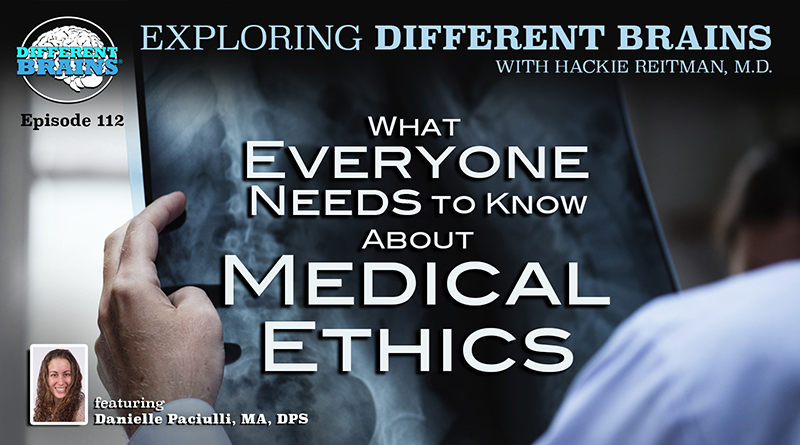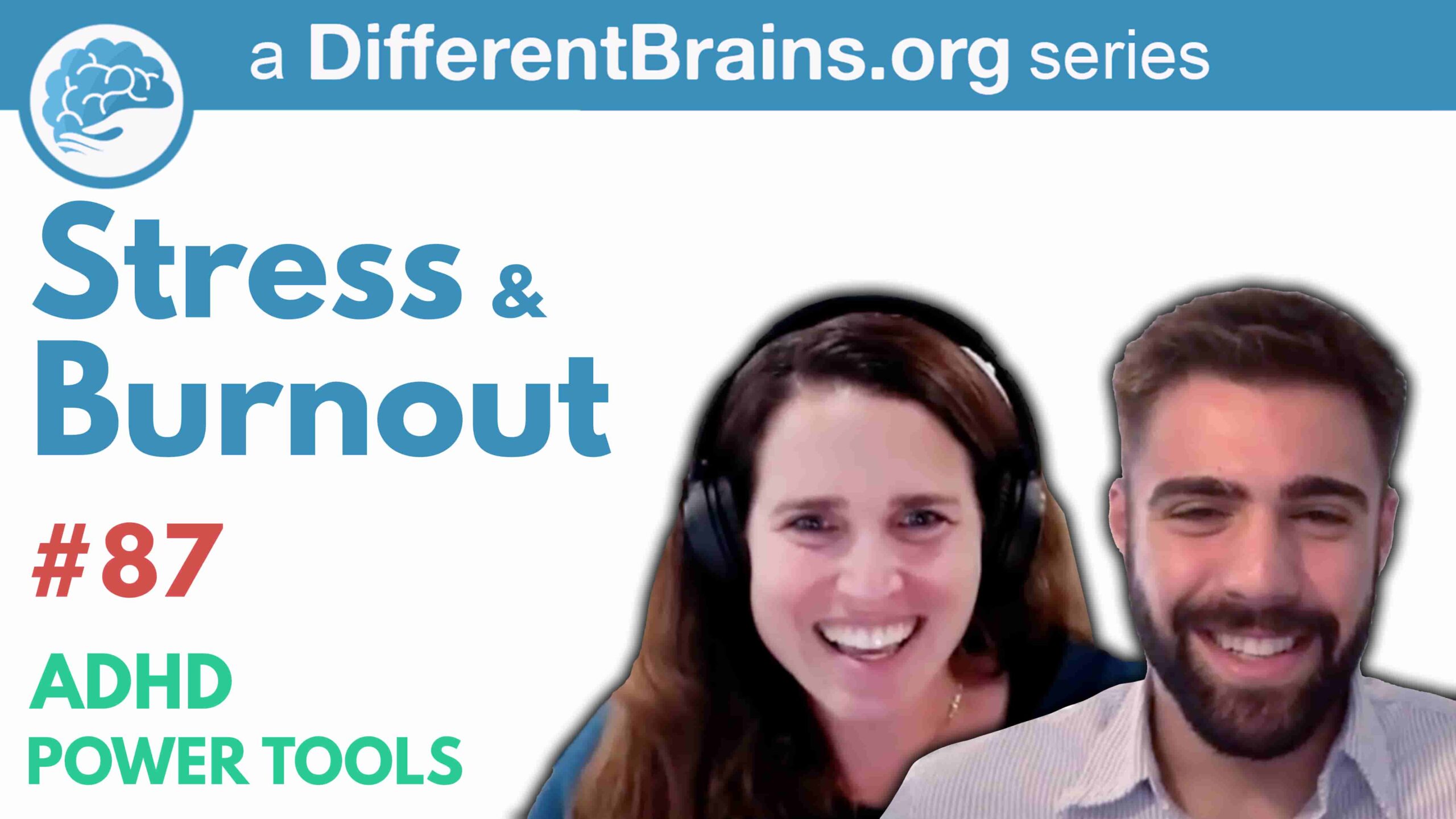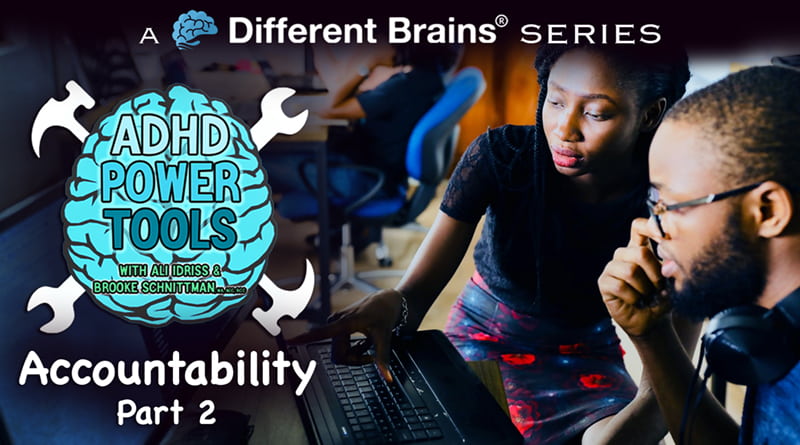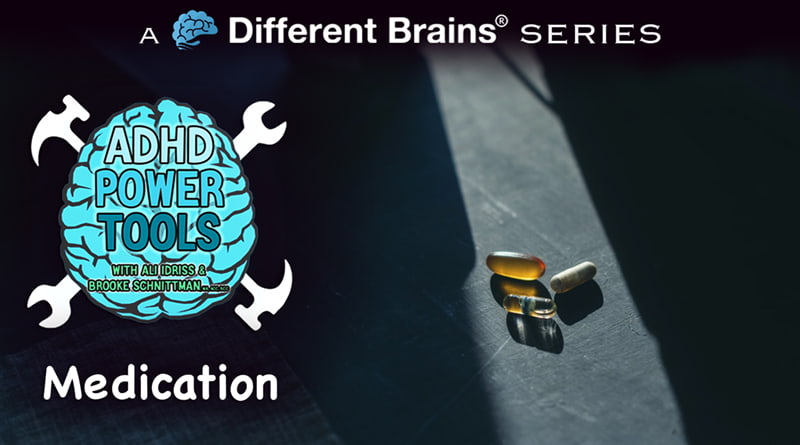
What Everyone Needs to Know About Medical Ethics, with Danielle Paciulli, MA, DPS | EDB 112
(18 mins) In this episode, Dr. Hackie Reitman is joined again by Danielle Paciulli, MA, DPS, a Clinical Ethics Consultant from the University of Minnesota School of Public Health. Danielle discusses what patients should know to avoid ethical dilemmas in their care, and the role ethicists play in new medical developments.
To contact Danielle, e-mail her at: dpaciulli@yahoo.com
.
76 Second Preview:
.
To listen or download the podcast version of this episode, see the embedded player below.
Or look for us on your favorite podcast provider:
iTunes | Stitcher | SoundCloud
[expand title=”View Full Transcript”]
HACKIE REITMAN (HR): Hi, I’m Dr. Hackie Reitman, and welcome to another episode of Exploring Different Brains, and today we have the privilege of having my new friend Dr. Danielle Paciulli, the medical ethicist. Danielle, thank you for joining us here at Different Brains.
DANIELLE PACIULLI (DP): Oh, thank you so much for having me. So exciting to be here, I can’t wait to share my knowledge.
HR: As a medical ethicist, and again, um, I think most of our viewership is probably a bit like me with not being as up to, up to snuff on this stuff as we should, what’s something about your job that we would have no idea, that would surprise us, if you can think of something that you do as a medical ethicist in a hospital, in the board, in the medical committee there, the medical ethics committee might do?
DP: Let’s see, uhh, I would have to say that my position does a lot of odds and ends, things that don’t even get necessarily thought of and, specifically speaking, so my role in a hospital is the clinical ethicist. I also teach, so with that role comes research and for, for research purposes I am asked to counsel, uh, the research in the hospital and, and ensure that they are being ethical with their research. So one of my most recent publications actually is on educating. I was, in this paper, I was promoting that stem cell researchers need to have ethics education training, but regardless, so for stem cell research, if you’re a researcher in stem cells, you can do your research on animals or on human subjects.
So what I was promoting, in this paper, anyway, which I then of course tried to enforce in the hospital, is that whichever type of research you do, you should be trained ethically in both aspects, humans and animals, because you need to understand, at the end of the day, where this research that you’re doing is going to. Just bringing it all back to the humanistic side, making everyone realize again what they’re doing, what it’s for, how it’s beneficial, so that might be one role, though that’s a very specific example, but that may be one role that a clinical ethicist or an ethics committee does in a hospital: make people aware that the situation, whatever the situation might be, is for patients and families and a human, a real human, and I think that’s, that’s easy to say, it’s easy to think about, but it’s very hard to do when you’re just engulfed in all of this going around you in a hospital it’s, it’s like a world of nothing else, so I think that may be one thing.
HR: Well, thank you. Now, um, take us through we’ve re- we’re reading a lot now about the very controversial in many ways, while very exciting and having many possibilities, the genetic engineering that comes along with the CRISPR and all the other things goin’ on, uhh, with all the genetics involved and everything else in 23andMe and the whole gamut. Can you comment on that?
DP: So when a new technology or a new way of life, perhaps, comes about, the way ethics and ethics committees function to comment and evaluate on things is through some time and through some more knowledge, so with CRISPR, we had more exposure to it, and although CRISPR can offer great beneficial things, however there are some ethical issues that we do need to consider for each situation, so there is no-
HR: Could you, could you, uhh, I’m sorry to interrupt, could you just take a moment and explain to our audience, who might not know, what CRISPR is?
DP: Sure. So I may a little off the cuff with the explanation, but I will do my best. So CRISPR technology is for- how shall I explain this? -for genetic purposes, to help ermm, I’m looking for the right words to use, to alter or change, umm, the genetics of an individual. Would that be a proper explanation?
HR: Well, here’s what I, based on my extremely limited knowledge, and you’re probably more knowledgeable than me, umm, the way it was explained to me is whatever you wanna say about our genes and our DNA and everything, they’re in a certain order, (chuckle) and what they can now do is kinda change the arrangement and customize these pools of genes in DNA and so on, so for instance, theoretically you can, uhh, umm, take the genes of somebody while they’re in formation and alter the sequence so that they’ll be “better”. Umm, I may be way off with that, and, uhh, it’s, it has to do with customization of the unique individual.
DP: Correct. So to bounce off of that a little bit more perhaps for more clarity of what I said, anyway, is there’s a movie, it’s quite dated now, but it’s very timely, called Gattaca, and uh, I think that perfectly depicts what is going on with CRISPR technology. In this movie, very quickly, families can choose what type of traits they want in their, in their unborn children and then they can, nine months later, have this perfect child as you say. So that’s a very timely movie to explain CRISPR and this was, again, a dated movie. CRISPR also the conversation which maybe more people are familiar with is specifying for sex for children and identifying if they would like a boy or a girl, for example. Now, although this is not exactly CRISPR technology, that may help the audience understand it a little bit better, you can identify A or B and then pick, sort of.
HR: So that must be an expanding, umm, landscape for the medical ethicist, I’d imagine.
DP: Yes, you know, one very wonderful thing about the career that I am in is it’s ever-growing. Right, because technology changes all the time, technol- new technology comes about, and with that, new ethical dilemmas, so for artificial intelligence, for example, that’s becoming more popular and getting more popularity. Ethics is all involved in that. When I say ethics, again, I mean the broader ethical community, are involved in that. Stem cell research, bio-banking, you know, organ and tissue donation, which is another passion of mine, that’s, all of that is just gaining, so ethics as a whole is growing because technology and the world as a whole is growing and changing. And, if you think about it, you wouldn’t want a technology like CRISPR or like organ donation to not be ethical and to not be just and fair. You would want every chance possible to be equal if you need a kidney, versus a stranger needing a kidney. You want those odds to be equal, and that’s where ethics comes into play, to make sure that everything for every individual is fair and right, regardless of anything else.
HR: Now, for our audience who have family members in their care with anything to do with our Different Brains from, as we say here at DifferentBrains.org, from autism to Alzheimer’s, and all brains in between, what are the steps they might take to avoid some of the ethical dilemmas where decision-making may become a problem in the medical setting? What are some of the basic checklists that you might have them do to say: “Look, this could avoid a lot of problems for you if you did x, y, and z.”? Could you expand on that?
DP: Well, of course, so one of the another committees that I am involved in is a committee for developmentally disabled individuals, but trying to enact, at least in New York State and other states that already have it, actually, this form, so it’s, it’s a form that every individual with a developmental disability would be required to have, this way, when they went into a hospital or into any type of medical facility, with their name pops up this form. “This patient likes blue, they don’t like lights, lights bother them.” It’s a very basic form, it’s almost mindless, if you think about it. Why not have this form? But lots of legal ramifications get in the way of just implementing this form. But for example, just in the meantime while we wait for this form to come out across all states, just have a preset list of what your family member likes, what they don’t like, and it can be, again, very basic things: “They like food, light sensitivity bothers them, so they’ll become hostile if the light is on over their head.”
Things that you don’t even think about but can be a big difference and make a change in a patient in a hospital, so if the light is off, for example, then they may not need to be handcuffed to the bed because then they’re not considered, you know, a danger to anyone else around them. So I would say just have a very brief list of things that this patient, or that your family member, rather, would appreciate and benefit from, and also talk to the individual and see, and ex- and, and of course, every situation, again, is different, but just explain some things, explain however best you can in your particular situation about what is going on or what can potentially happen and how, and how the, the medical community works and how, how hospital setting may be different from a home setting, how you can’t necessarily walk and just leave a hospital bed and start walking the halls, for example. Just very basic information would be not only necessary for a great conversation to get started between family members, but also just to help the flow and the dynamic of the situation, and again, depending upon the type of individual, there may be followup conversations, there may be questions stewing in the individual’s brain that they may think of later, and if not, then, again, that sheet of what they like what they don’t like could make all the difference. Wh- uhh, this one patient I had was developmentally disabled and they weren’t eating, but it wasn’t because of food this time, because my staff had thought maybe it was the food, so again, if you’re presented with a case, more often than not, the medical staff is aware and they’ll learn from the situation, which is great. So this time, the medical staff thought, “Hmm, maybe this person doesn’t like this food.” So they asked, and the individual had no problem with the food, but they weren’t eating. And what was the issue is this person wouldn’t eat with a metal fork. They didn’t like the taste of metal touching their tongue or their mouth and their teeth. It hurt them. But that’s why they weren’t eating and they were told when they were brought up as a child to never eat with your fingers because that was wrong and disrespectful. But because these were not conveyed to the medical staff, this person just, again, wasn’t eating. So something simple like that could go on a list: “They need plastic,” or anything, anything that you think would make the family member and yourself life easier, I would say, can only be beneficial.
HR: I feel that we’d be remiss if we did not touch on the medical ethics component and your unique point of view on the very famous Willowbrook case. Give us some background.
DP: So the famous ethics case, which is called Willowbrook, was a hospital located on Staten Island, New York, and it was for individuals with developmental disabilities, and the reason that there was such an ethical uproar and dilemma over the care at Willowbrook was because the individuals who were there were there to get proper treatment and proper care for whatever developmental disability they may have had, and the, the staff was not caring for them, and I say caring for them at all. They were mistreating them, they were downright physically, mentally abusing them, they were not giving proper hygeine, there were a whole slew of unfortunate issues and this is important to be brought up because the developmentally disability community needs to understand that although this horror scene happened, and nightmare happened, we are more aware now, “we” meaning the ethics community, are more aware that this has occurred, so now we know how to reassure your family members to ensure that this will not occur again, wherever your family member is placed.
I know that some families who have a developmental disability individual are frightful to put them into a group home or a, a l-, a living facility because they’re unsure of the proper care and treatment they get, but I do just want to reassure you and say that although this horror scene from Willowbrook did occur, it won’t not occur anymore today, because of all the checkpoints and ethical barriers that have been set and in place for these individuals to ensure that although maybe some individuals cannot speak and vocalize, their are check plates, checkpoints that come out to ensure that the families are properly cared for. And every human should be valued as a human, and that’s what ethics does, to make sure that every human is seen equally and cared for equally. And I just thought that that was an important point to mention about Willowbrook.
HR: Thank you. Uhh, now how does an individual contact a medical ethicist, where- wherever they might live and be, like you know they say, “Up until today when I watched Different Brains, I didn’t even know what a medical ethicist was. I think I wanna call about Uncle Ned, I wanna discuss this with a medical ethicist. Is that a call they can make?
DP: So I, I don’t know, to answer that, again, every hospital, every state has different guidelines, but you can certainly make a call and see where it will take you. In a hospital, you can just request to speak to an ethics consultant or an ethics committee and the same would go for if an individual is living into, in a group home or a group type setting. You would get someone to speak to about an ethical dilemma. So that is just simply what you would have to say. Again, not every place is completely staffed with someone. You might get someone from Patient Advocacy, but then, perhaps they can redirect you to another local state, perhaps, where you can speak to, uhh, an ethics consultant, for example. So there are ways to reach us, and hopefully in the future, the plan is to be able to reach us more accessibly, because right now, we are a very small niche of individuals, but growing more hospitals across the US will have more individuals trained on staff to be a clinical ethicist.
HR: It sounds like a very small sorority/fraternity you have there. Do you guys (laugh) and gals, medical ethicists, do you have like a, any central organizations with a website or anything?
DP: So as an ethics community we do, not specifically as a clinical ethicist, and the one organization that comes to mind is ASBH. It’s an organization for bioethics communities so ethics tends often to get placed into the bioethics family, so there, to my knowledge anyway, there is no clinical ethics committee or membership at this time, but there is the bioethics membership, which is what we are grouped in right now, and it is a very small set of us. Currently, to my knowledge, there are only two schools in the US that teach what I do, so that’s why we are small in numbers, but we are growing, so that is exciting to find out.
HR: To get in touch with you, Doctor, what are some of the websites they might go to?
DP: So the best email to reach me at is dpaciulli@yahoo.com and I will spell that for you. So it’s D-P-A-C-I-U-L-L-I@yahoo.com and that’s an email you can always get me at. Feel free to email me with any questions, any concerns that you may have or just wan-, wanting to know more.
HR: Well, Dr. Danielle Paciulli, thank you so much for being with us for this episode of Exploring Different Brains. Thank you.
DP: Thank you so much.
[/expand]
.




